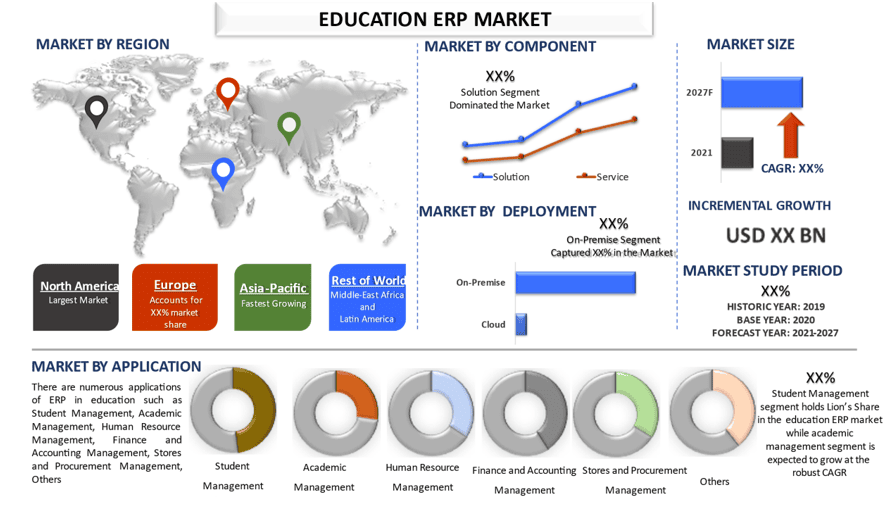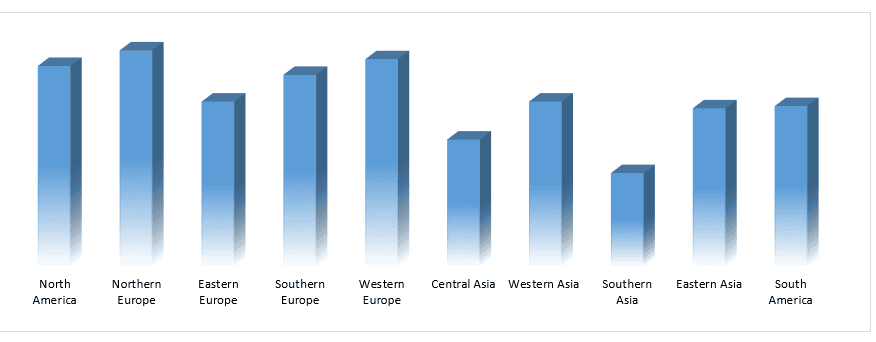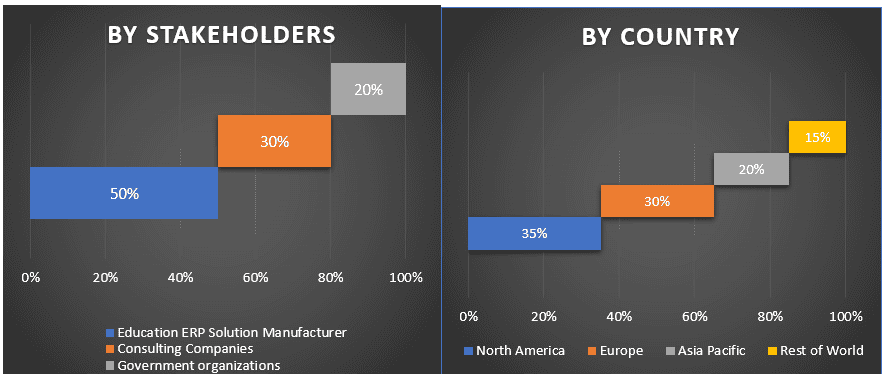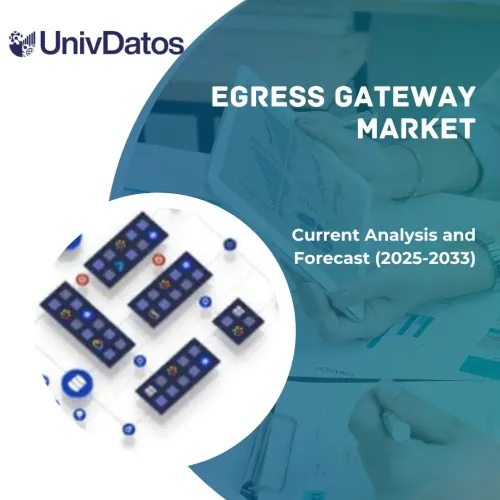- Home
- About Us
- Industry
- Services
- Reading
- Contact Us
Education ERP Market: Current Analysis and Forecast (2021-2027)
Emphasis on Component (Solution, Services); Deployment Type (On-Premise, Cloud); Application (Student Management, Academic Management, Human Resource Management, Finance & Accounting Management, Stores & Procurement Management, Others); End-User (K-12, Higher Education); Region/Country

The Global Education ERP is Expected to Display an Elevated CAGR of ~15% over the forecast period (2021-2027)
A rise in smartphone adoption across the globe is one of the prominent reasons driving the market of Education ERP. The key factor attributed to the growing adoption of smartphones is a surge in the end user’s disposable income. Rising purchasing power in developing countries such as Australia, EU, Mexico, Brazil, India, Thailand, and China is projected to allow consumers to spend more on smart devices. As per OCED, the household spending in Canada, China, Denmark, European Union, France, and Germany reached to 1,021,459.5, 9,241,095.5, 139,229.8, 10,785,281.3, 1,561,879.9 and 2,288,541.1 US$ million, respectively.
The Education ERP market is uplifting on account of the emerging demand from generations Y and Z. Moreover, the adoption of smart devices such as phones, tablets, and laptops are also adding pace to the growth of the market. In April 2019, Zovio, a US-based education technology services company, acquired TutorMe for an undisclosed amount. This acquisition will support the new strategy of Zovio and provide a platform for introducing new products in the future
Also, proliferating internet penetration across the globe coupled with the uplifting 5G technology adoption is leading to the growth of the Education ERP market. As per Statista, as of January 2021, there were 4.66 billion active internet users worldwide – 59.5 percent of the global population. Of this total, 92.6 percent (4.32 billion) accessed the internet via mobile devices. Moreover, GSMA revealed that there will be around 1.8 billion 5G connections by 2025
Global Internet Penetration, By Selected Regions, 2021
Microsoft, Oracle, SAP, Anubavam, Blackbaud, Brainvire, Edumarshal, Ellucian, Entab, and Focus Softnet, etc. are some of the prominent players operating in the Education ERP market. Several M&As along with partnerships have been undertaken by these players to facilitate customers with hi-tech and innovative products.
Insights Presented in the Report
“Amongst Components, Solution segment holds the major share”
Based on the components, the market is fragmented into Solutions and Services. The solution segment grabbed the major market share and dominated the market. However, with the growing awareness about the benefits of education ERP, the demand for services would emerge in the forthcoming years. In 2020, G2 launched several new software categories for education ERP software, offering our most comprehensive breakdown to date of the top tools for school management operations
“Amongst Deployment Type, On-Premise segment to grab considerable market share”
Based on deployment type, the market is fragmented into cloud and on-premise. The on-premise segment grabbed the major market share and dominated the market. However, the cloud segment would witness exhibit growth in the forthcoming years. The key factors attributed to the growing market of cloud-based education deployment are cost incurred for the set-up as the proposition of an On-premise ERP system is highly expensive when compared to the Online counterpart
“Amongst Application, Student Management segment holds the major share”
Based on the application, the market is fragmented into Student Management, Academic Management, Human Resource Management, Finance and Accounting Management, Stores and Procurement Management, and Others. The student management segment grabbed the major market share and dominated the market.
“Amongst End-User, Higher Education segment holds the major share”
Based on the End-User, the market is fragmented into K-12 and higher education. The higher education segment grabbed the major market share and dominated the market. Institutions of higher education need to be more engaging, responsive, and insightful than ever before. Institutions also need to provide automated, targeted, and personalized communications and outreach efforts to deliver the right message to the right audience at the right time via the right channel. therefore, demanding education ERP.
“North America represents one of the largest markets of Education ERP market”
For a better understanding of the market dynamics of the Education ERP market, a detailed analysis was conducted for different regions across the globe including North America, Europe, Asia Pacific, and the Rest of the world. North America dominated the market and generated the leading revenue share in 2020 owing to the availability of Education ERP solution providers in abundance and offering of new courses are some of the factors that are contributing to the growth of the market.
Reasons to buy this report:
- The study includes market sizing and forecasting analysis validated by authenticated key industry experts
- The report presents a quick review of overall industry performance at one glance
- The report covers an in-depth analysis of prominent industry peers with a primary focus on key business financials, product portfolio, expansion strategies, and recent developments
- Detailed examination of drivers, restraints, key trends, and opportunities prevailing in the industry
- The study comprehensively covers the market across different segments
- Deep dive regional level analysis of the industry
Customization Options:
The Education ERP Market can further be customized as per the requirement or any other market segment. Besides this, UMI understands that you may have your own business needs, hence feel free to connect with us to get a report that completely suits your requirements.
Table of Content
Analyzing the historical market, estimation of the current market, and forecasting the future market of the Education ERP Market were the three major steps undertaken to create and analyze the demand for Education ERP across major regions. Exhaustive secondary research was conducted to collect the historical market numbers and estimate the current market size. Secondly, to validate these insights, numerous findings and assumptions were taken into consideration. Moreover, exhaustive primary interviews were also conducted, with industry experts across the value chain of the Education ERP market. Post assumption and validation of market numbers through primary interviews, we employed a top-down/ bottom-up approach to forecast the complete market size. Thereafter, market breakdown and data triangulation methods were adopted to estimate and analyze the market size of segments and sub-segments the industry pertains to. Detailed methodology is explained below:
Analysis of Historical Market Size
Step 1: In-Depth Study of Secondary Sources:
Detailed secondary study was conducted to obtain the historical market size of the Education ERP through company internal sources such as annual reports & financial statements, performance presentations, press releases, etc., and external sources including journals, news & articles, government publications, competitor publications, sector reports, third-party database, and other credible publications.
Step 2: Market Segmentation:
After obtaining the historical market size of the Education ERP market, we conducted a detailed secondary analysis to gather historical market insights and share for component, deployment, end-user, and application for major regions. Major segments included in the report are component, deployment, and application. Further region and country-level analyses were conducted to evaluate the overall adoption of Education ERP across the globe.
Step 3: Factor Analysis:
After acquiring the historical market size of different segments and sub-segments, we conducted a detailed factor analysis to estimate the current market size of the Education ERP. Further, we conducted factor analysis using dependent and independent variables such as the lockdown due to COVID 19, rising smartphone adoption, etc., A thorough analysis was conducted for demand and supply-side scenarios considering top partnerships, merger and acquisition, business expansion, and product launches in the Education ERP industry across the globe.
Current Market Size Estimate & Forecast
Current Market Sizing: Based on actionable insights from the above 3 steps, we arrived at the current market size, key players in the Education ERP market, and market shares of the segments. All the required percentage shares split, and market breakdowns were determined using the above-mentioned secondary approach and were verified through primary interviews.
Estimation & Forecasting: For market estimation and forecast, weightage was assigned to different factors including drivers & trends, restraints, and opportunities available for the stakeholders. After analyzing these factors, relevant forecasting techniques i.e. bottom-up/ top-down approach was applied to arrive at the market forecast about 2027 for different segments and subsegments across the major markets globally. The research methodology adopted to estimate the market size encompasses:
- The industry’s market size, in terms of value (US$) and the adoption rate of Education ERP across the major markets domestically
- All percentage shares, splits, and breakdowns of market segments and sub-segments
- Key players in the Education ERP market in terms of services offered. Also, the growth strategies adopted by these players to compete in the fast-growing market
Market Size and Share Validation
Primary Research: In-depth interviews were conducted with the Key Opinion Leaders (KOLs) including Top Level Executives (CXO/VPs, Sales Head, Marketing Head, Operational Head, and Regional Head, Country Head, etc.) across major regions. Primary research findings were then summarized, and statistical analysis was performed to prove the stated hypothesis. Inputs from primary research were consolidated with secondary findings, hence turning information into actionable insights.
Split of Primary Participants in Different Regions
Market Engineering
Data triangulation technique was employed to complete the overall market estimation and to arrive at precise statistical numbers of each segment and sub-segment of the Education ERP market. Data was split into several segments sub-segments post studying various parameters and trends in the areas of the component, deployment, and end-user of the Education ERP market.
Main Objective of the Education ERP Market Study
The current & future market trends of Education ERP were pinpointed in the study. Investors can gain strategic insights to base their discretion for investments from the qualitative and quantitative analysis performed in the study. Current and future market trends were determined the overall attractiveness of the market at a regional level, providing a platform for the industrial participant to exploit the untapped market to benefit as a first-mover advantage. Other quantitative goals of the studies include:
- Analyze the current and forecast market size of Education ERP in terms of value (US$). Also, analyze the current and forecast market size of different segments and sub-segments
- Segments in the study include areas of component, deployment, application, and end-user
- Define and analysis of the regulatory framework for the Education ERP industry
- Analyze the value chain involved with the presence of various intermediaries, along with analyzing customer and competitor behaviors of the industry
- Analyze the current and forecast market size of the Education ERP market for the major countries
- The major region studied in the report includes North America, Europe, Asia- Pacific, and the Rest of the World.
- Company profiles of the Education ERP market and the growth strategies adopted by the market players to sustain in the fast-growing market
Deep dive regional level analysis of the industry
Related Reports
Customers who bought this item also bought










